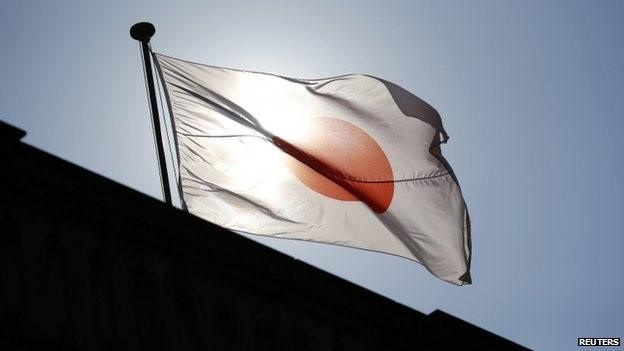Japan’s savings rate turns negative for first time
- Published

For the first time since records were collected in 1955, Japan's population is drawing down its savings and the savings rate, calculated as savings divided by disposable income plus pension payments, was negative 1.3%.
It's a dramatic change from when the Japanese saved nearly a quarter of their income (23.1%) when the savings rate peaked in 1975.
Japan had the highest household saving rate in the OECD in the 1960s until it fell to the lowest. After all, an aging population draws down savings and Japan is the fastest-aging country in the world; its population has been shrinking for a decade.
It's another blow to the Japanese Prime Minister Shinzo Abe, who just won another term to try and implement his policies dubbed Abenomics. On the campaign trail, he said that Abenomics aimed to raise wages and employment to revive the economy and defeat deflation or price falls.
Yet, earnings (adjusted for inflation) dropped 4.3% from a year earlier in November. It's the steepest decline since the 2009 global crisis and marks the 17th month of falls.
Indebted country
Unsurprisingly, households are spending less. The average spend has dropped by 2.5%, which is the eighth consecutive drop - a trend that won't help boost domestic demand and prices.
Indeed, inflation has clocked in at a 14 month low. There's no price pressure on nominal yields on government bonds. The 10 year bond yield has fallen to a record low of below 0.3%.
Such low borrowing costs will help the highly indebted country, but it also reflects an expectation that the economy and inflation won't be getting going, and ultimately lead to rate rises.
In sum, it's a tough slew of data for Abenomics.
Since their debt crisis in the early 1990s, the Japanese have been reluctant to borrow on a large scale. So, unless wages rise sustainably, it's hard to see how household spending can. Without more domestic demand, firms are reluctant to raise wages and invest, which is why they still hold substantial cash.
In fact, Japanese firms' cash holdings have risen by about 12% since Abe came to power two years ago, and reached a record high of close to $2 trillion (some $1.96 trillion or 233 trillion yen).
Domestic consumption
The high savings rate of Japanese firms is also why declining household savings hadn't noticeably affected the country's current account surplus - which measures the amount of money made investing from the rest of the world as well as trade - for a while.
With savings drawn down and falling wages, it'll be hard for Japan to rely on consumption to recover. Until consumer spending does recover, Japan faces an uphill battle to revive its domestic economy.
I've written before about how developed nations are aging and 'turning Japanese' in that sense.
Another lesson to draw is that an aging population will dis-save, so high-saving countries now - like China and Germany - may soon find that they are heading down a similar road to Japan.